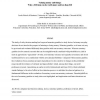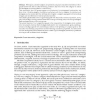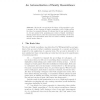49 search results - page 2 / 10 » Can Losing Lead to Winning |
ATAL
2006
Springer
13 years 9 months ago
2006
Springer
We consider PAC learning of simple cooperative games, in which the coalitions are partitioned into "winning" and "losing" coalitions. We analyze the complexity...
MANSCI
2010
13 years 3 months ago
2010
The study of risky decision-making has long used monetary gambles to study choice, but many everyday decisions do not involve the prospect of winning or losing money. Monetary gam...
FSTTCS
2007
Springer
13 years 11 months ago
2007
Springer
Abstract. We explain a double-category (of positions and plays) attached to the theory of HOgames (those with the so-called switching condition [7]) from which the category of aren...
FSTTCS
2008
Springer
13 years 6 months ago
2008
Springer
We survey determinacy, definability, and complexity issues of Banach-Mazur games on finite and infinite graphs. Infinite games where two players take turns to move a token thro...
JAPLL
2007
13 years 4 months ago
2007
We invoke concepts from the theory of hypergraphs to give a measure of the closeness of family resemblance, and to make precise the idea of a composite likeness. It is shown that f...



